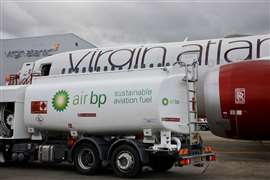UK government signs Sustainable Aviation Fuel mandate
19 November 2024
 In November 2023, Virgin Atlantic Flight 100 was the first transatlantic crossing using 100% SAF (Photo: Virgin Atlantic)
In November 2023, Virgin Atlantic Flight 100 was the first transatlantic crossing using 100% SAF (Photo: Virgin Atlantic)
The UK Minister for Aviation, Mike Kane, has signed the Sustainable Aviation Fuel (SAF) mandate, bringing into law new guidelines intended to outline the future decarbonisation of air travel in the country.
The UK is one of the first countries to deliver a roadmap to reducing GHG emissions related to air travel. Legislation will come intro effect from 1 January, 2025.
From that start date, the SAF mandate will require 2% of all jet fuel demand in the UK be made up of sustainable fuel. This will increase to 10% in 2030 and then to 22% in 2040. The level will remain at 22% until ‘there is greater certainty regarding SAF supply’.
Additionally, the mandate will encourage the development of advanced duels that can generate greater emission reductions and also the diversification of feedstocks to reduce dependence on scarce resources.
To do this, the mandate includes a cap on the feedstocks used in the hydroprocessed esters and fatty acids (HEFA) process; but not until other types of SAF are also commercially viable. HEFA supply will not be limited under the mandate for the first two years, falling to 71% in 2030 and still contribute 35% in 2040.
Also, there is a separate obligation on power-to-liquid fuels from 2028 that reaches 3.5% of total jet fuel demand in 2040.
To support fuel producers, the bill has a revenue certainty mechanism for SAF producers looking to invest in new plants in the UK.
The mandate includes a buy-out mechanism for both the main and power-to-liquid obligations to incentivise supply while protecting consumers where suppliers are unable to secure a supply of SAF. These will be respectively set at £4.70 (approx $6.00) and £5.00 per litre of fuel, which is intended to offer ‘significant incentive’ for fuel suppliers to deliver SAF to the market rather than pay the buy out.
The Department for Transport estimates that the legislation will result in emissions reductions totalling up to 2.7 MtCO2e by 2030 and up to 6.3 MtCO2w by 2040.
CONECTAR-SE COM A EQUIPE





